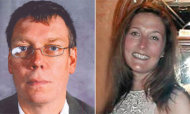David Gilroy will become the first convicted killer to have his sentence recorded on camera in a British court.
Judge Lord Bracadale will be recorded at the High Court in Edinburgh and the footage will then be transmitted by Sky Newsand other broadcasters.
Under an agreement reached with broadcasters, any interruptions will be edited out.
Scotland's judiciary agreed to allow filming because of the amount of public interest in the case.
Gilroy, 49, murdered his former lover, 38 year-old Suzanne Pilley, in May 2010 before dumping her body.
It has never been found.
He was convicted of the killing in March .
 The television camera will record the judge's entry into the courtroom, then pause until he begins his sentencing statement.
The television camera will record the judge's entry into the courtroom, then pause until he begins his sentencing statement.
Lord Bracadale is expected to begin with the words: "David Gilroy, please stand..." and will then hand down the mandatory sentence of life imprisonment for murder and tell him how long he will serve in jail as a minimum term.
Since 1992, Scotland's judges have been permitted to allow cameras into court at their discretion.
Appeal rulings have been recorded in the past, as was a bail application by the Lockerbie bomber, Abdel Basset al-Megrahi.
Previously, there has also been filming in the Sheriff Courts for documentary and educational purposes.
Elizabeth Cutting, Head of Judicial Communications (Scotland), told Sky News: "This particular case has attracted a lot of media attention and public interest.
"The reason we've allowed this is that, at the sentencing stage, there is a very low risk to the administration of justice.
"It is simply the judge coming on the bench and passing sentence.
"We try to be as open and accessible as possible and explain the justice system to the public.
"This is another opportunity for us to allow the public to see what goes on in court.
"People can't get in court everyday to see what happens and justice should be seen to be done and this an opportunity for the public to see an accused being sentenced.
"It won't be transmitted live and there's a very good reason for that.
"Occasionally you can have some interruptions from the public gallery or from the accused.
"In order to preserve the dignity of the court and show some respect to the families of those closely involved in this very tragic case, we will take the film and edit out any interruptions before it is fed to media organisations via satellite."
The granting of permission to film inside the High Court, at a sentencing for a serious crime, is universally viewed as significant for media coverage of the justice system.
Scotland's legal system operates separately from that in England and Wales but, south of the border too, the court system is being opened up to the broadcast media.
The Supreme Court in London is already broadcast via the Sky News website and elsewhere.
Following a campaign by Sky News and other broadcasters, the Queen's speech is expected to include legislation paving the way for the televising of rulings in the Court of Appeal, south of the border.
No comments:
Post a Comment